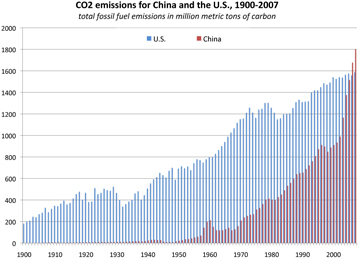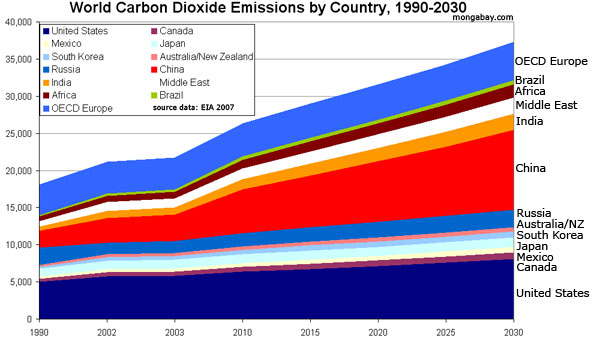Today may mark a turning point for a successful negotiation at the Climate Change Summit in Copenhagen or it may just be another blip in the up-and-down news cycles that have preceded the summit for months.
Just last week Asian nations along with US President Barack Obama announced they would not seek a binding agreement at the summit, but rather work toward a framework for a future agreement. Then APEC, the Asia Pacific Economic Cooperation made up of 21 Asian nations, announced it would not seek emission cuts at the summit. These announcements were seen by many as a march towards failure at Copenhagen.
Yet at the end of the week, Yvo do Boer, the Executive Secretary of the UN Framework Convention on Climate Change (UNFCC), was quoted as saying: “There is no doubt in my mind whatsoever that it [Copenhagen] will yield a success.” Either Boer was playing Pollyanna or he had insider knowledge. It appears it may be the latter.
 CO2 emissions from China and the United States from 1900-2007. |
For the past is past and today the sun has broken (maybe) through the haze on climate change negotiations as an official in the White House has confirmed that the US will set an emissions target prior to the summit. So far the Obama administration has been hesitant to set any targets as it waits for the US Senate to tackle climate change legislation, which the House already passed. However, it is clear that the Senate—bogged down by health care—will not take-up the legislation before the summit, and, despite rising warnings from scientists around the world about the need to tackle climate change now, there is no assurance that the US Senate—still backwards compared to the rest of the world when it comes to climate change—will vote in favor of a strong bill or any bill for that matter.
Since even the head of the UN, Ban ki-moon, has called the US the most important nation regarding climate change negotiations, many feared that stalling by the US Senate would derail negotiations entirely, thereby allowing one hundred Americans to hold global negotiations hostage. But today’s announcement seems to signal Obama’s Administration willingness to go forward with negotiations in spite of Congress. It’s a courageous move by the administration and one which the international community has been relentlessly pushing.
While it looks like there will still be no full treaty at the summit, de Boer has said that to be regarded a success the summit would not need to produce a binding treaty yet, but would need to produce three things: provide concrete emission targets by industrialized nations, a list of actions by developing nations, and a financial commitment from richer nations to help developing nations adapt to a warmer world. Once these terms are set a full binding treaty could be put in place in six months to a year. Last week even this seemed iffy, but now with the US setting a target these three wishes from de Boer seem suddenly quite possible.
The chances could improve even more if Obama, himself, would end the will-he or won’t-he debate and announce that he is attending the summit. The pressure has been building for months for Obama to attend—in the very least to make an appearance—as many other notable world leaders have already committed to attendance (sixty-five in total). But Obama is key: De Boer said last week that Obama’s presence at the summit “would make a huge difference”. Now that the US will be bringing emissions cuts to the table, there seems to be little to gain by Obama not attending, since his absence would only create ill will worldwide for the still much beloved (internationally, at least) US President and create a sense that the US still isn’t nearly as serious about global warming as the rest of the world.
Prior to election, Obama promised the American people that, unlike his predecessor, he would take decisive action on mitigating climate change and that he would be a world leader on the issue. So far, he hasn’t quite lived up to his promise, but he hasn’t fallen flat either. He has chosen instead to walk middle-of-the-road on the issue: domestically he barely mentions global warming—instead focusing on health care and the economy—but whenever he travels abroad, which is often, climate change is always near the top of the list. Eventually he’ll have to make the decision to go in all the way, or keep on using the Congress as an excuse for US inaction.
But of course all this is just the news today. The lead-up to the summit has been like watching a horse-race election—one day things look promising and bright, the next gloom and despair set in. Today the situation is looking good, certainly better than last week. But who knows what tomorrow will bring?

Past and projected CO2 emissions for countries, 1990-2030. The Department of Energy’s (DOE) Energy Information Administration’s (EIA) forecasts for emissions from energy use until 2030.
Related articles
Holding the Global North Responsible for Climate Change: What Would Lord Russell Do?
(11/16/2009) If Lord Bertrand Russell were still alive today, he would most likely be appalled by the Global North’s glaring inaction on climate change. One of the twentieth century’s most eminent philosophers, Russell was also an outspoken critic of war and irrationality. In 1966, just as the United States was ramping up the war in Vietnam, Russell helped to establish a novel legal tribunal which condemned war crimes committed in South East Asia.
Asia-Pacific leaders drop emissions cuts from Copenhagen agenda
(11/16/2009) Leaders of the 21-member Asia Pacific Economic Cooperation (APEC) dropped the reference to greenhouse gas emissions cuts from their declaration released Sunday, reports Reuters.
UN singles out US as the most important nation for global warming negotiations
(11/11/2009) Visiting Washington DC, Secretary-General Ban Ki-Moon stated that the United States was the world’s most important actor when it comes to negotiations for a new climate change treaty, while urging the Senate to move forward on legislation.
Nations vulnerable to global warming present demands: carbon levels below 350ppm and billions in aid
(11/10/2009) A group of nations especially vulnerable to the effects of climate change have released a declaration calling for developed countries to keep CO2 emission below 350 parts per million (ppm) and to give 1.5 percent of their gross domestic product to aid developing nations in adapting to the myriad impacts of climate change.
500 global business leaders call for 50-85% cut in emissions by 2050
(09/22/2009) In a statement issued today, more than 500 business leaders have called for “an ambitious, robust and equitable global deal” on climate change.
Japan throws down gauntlet, vows to cut greenhouse gas emissions 25 percent by 2020
(09/07/2009) The new prime minister of Japan, Yukio Hatoyama, has thrown down the gauntlet to other industrialized nations in the lead-up to the UN Climate Change Summit in Copenhagen this December. He had pledged to cut his nation’s greenhouse gas emissions 25 percent from 1990 levels (the set date for the Kyoto Treaty) by 2020.
Political heat rising on climate change, but does the United States feel it?
(09/02/2009) The UN Summit on Climate Change isn’t for three months, yet the political temperature has been rising steadily over the summer. The heat is especially focused on the three big players at the summit: China, India, and the United States.
Maldives president tells world: ‘please, don’t be stupid’ on climate change
(09/01/2009) “Please, don’t be stupid,” Mohamed Nasheed told the world regarding the need to act decisively against climate change. To underlie his message, Nasheed announced that his country will become carbon neutral in ten years.













